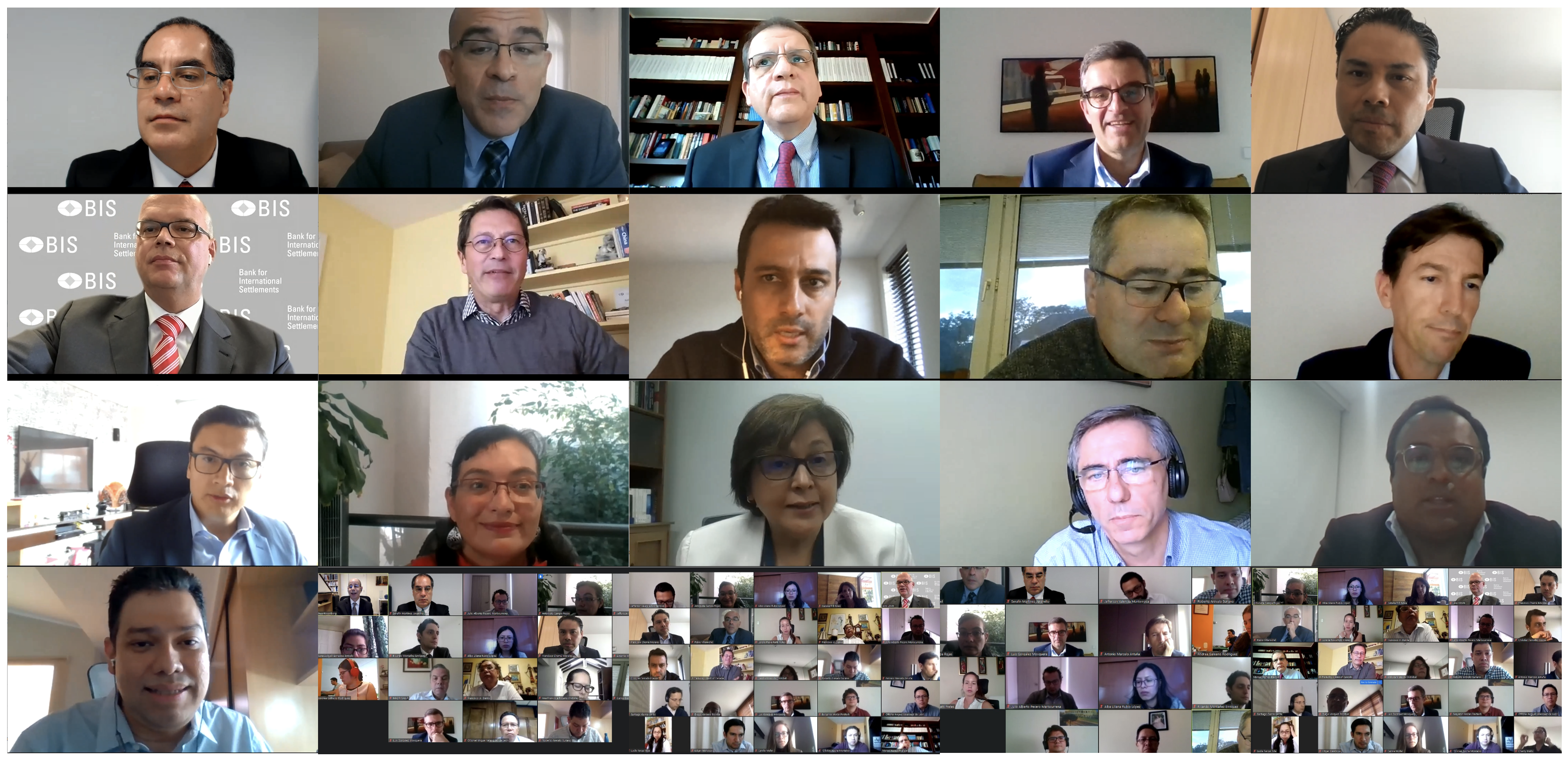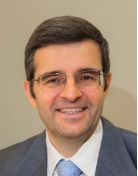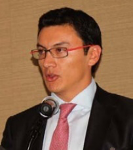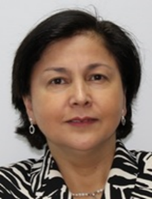
Disponible en Español ![]()
I Meeting of Heads of Financial Risk Management in Central Banks
Digital format, from the 7th to the 9th of October, 2020.
The Meeting of Heads of Financial Risk Management in Central Banks was conceived as a space to foster the discussion, the communication and the exchange of experiences and best practices for financial risk management among managers or experts in financial risk of institutions of the members of the Center for Latin American Monetary Studies (CEMLA), as a part of the International Meetings that take place under the technical secretariat of CEMLA. Its conception and organization were the result of a joint effort among CEMLA, Banco Central de Costa Rica, Banco de España and Banco de México, originated at the Seminar on Financial Risks Management in Central Banking held in Madrid, Spain in 2019.
The first edition of the Meeting was held on a digital format on October 7-9, 2020, and was attended by 74 representatives from 25 institutions and associates of CEMLA from the following countries: Argentina, Bahamas, Bolivia, Brazil, Canada, Chile, Colombia, Costa Rica, Dominican Republic, Ecuador, El Salvador, Guatemala, Honduras, Mexico, Nicaragua, Paraguay, Peru, Philippines, Portugal, Spain, Switzerland, United States and Uruguay. The event was focused on the following topics: risk management governance, the reaction to the COVID-19 crisis and the mechanisms of liquidity provisions, and financial risk from the front office perspective. Each topic was assigned to a day of the meeting.
Day 1
Panel 1. Governance Part I
Risk management governance in central banks
Jens Ulrich, Head of Risk Management, Bank of International Settlements (BIS)
Mr. Ulrich spoke about risk management governance in central banks and in BIS. He described the characteristics of BIS and how it relates to the Financial Risk Management unit; he outlined its functions and structure. He commented about the operational risk, its transformation within the bank. He stated a set of considerations to reflect upon the risk governance structure that best suits an institution and its risk managers. Finally, he talked about resilience: his experience during the COVID-19 crisis and his considerations about good and bad practices for risk management and risk culture.
Financial Risk Management Governance at the Bank of Canada
Jean-François Tremblay, Deputy Managing Director of Financial and Enterprise Risk, Bank of Canada
Mr. Tremblay presented the framework of the Bank of Canada Financial Risk Management and its development in the last years, the characteristics and elements that has obtained and the processes and tools that has put in place at the current level of maturity. He also described the response against the COVID-19 crisis and the effective management under the risk framework. He also explained the crisis required to solve new challenges, such as fast decision making and corresponding agile reporting systems. He concluded with a list of factors that lead to a successful risk management, such as an institutionalized framework, risk culture, the ability to update plans and act accordingly.
Panel 1. Governance Part II
Risk Management Governance at the Central Bank of Chile
Christian Ferrada K., Corporate and Financial Risks Coordinator
Mr. Ferrada talked about the three lines of defense model as part of the best practices for Risk Management implemented at the Banco Central de Chile. He also described the current risk management framework of the institution, its organization, development, relations with other areas within the central bank and practices.
Organization of Financial Risk Management Units in Central Banks: Some Reflections
Luis González Mosquera, Director of the Financial Risk Department
Mr. González presented a description of the financial risk management at central banks and the governance structure on which it works and allows the interaction with the different sections in the central bank towards the efficiency of investment. He also described technical aspects of the surveillance process within Banco de España.
Day 2
Session 1. Reactions to the COVID-19 crisis
ECB measures during the recent COVID-19 crisis
Carlos Bernadell, Adviser to the Executive Board, European Central Bank (ECB)
Mr. Bernadell began his presentation with an economic outlook of the European economies, he pointed out the euro area is expected to contract in 2020 and recover in 2021. He later compared the expansion of the balance sheets in different Central Banks of advanced economies, which in general was larger during the COVID-19 crisis than during the Great Financial Crisis (GFC) for many advanced economies. The ECB had different measures at its disposal to mitigate the effects of the COVID-19 crises, such as asset purchases, lending programs, swap or repo lines or supervisory actions. One of the formers was the Pandemic Emergency Purchase Program (PEPP), a temporary program with an overall envelope of €1350 billion. Also, Mr. Bernadell mentioned the risk management aspects of these measures, e.g. managing a larger balance sheet, considering an increased risk appetite and the possible increase in idiosyncratic and reputational risk.
Risk Management during the Pandemic Crisis
Joshua Rosenberg, Executive Vice President and Chief Risk Officer, Federal Reserve Bank of New York
Mr. Rosenberg presented the different programs put into effect by the Federal Reserve Bank of New York or other Federal Reserve Banks to face the crises caused by the COVID-19 pandemic. He described the risk management aspects of the facilities and how they impacted the market conditions.
Panel 2. Mechanisms of liquidity provision in emergency situations
Role of Credit Claims in Monetary Policy Financing Operations
Antonio Marcelo Antuña, Head of Risk Measurement Division, Banco de España
Mr. Marcelo began his presentation describing the Emergency Liquidity Assistances, which consist in urgent liquidity provisions for solvent institutions. The use of credit claims as collateral rose considerably after the European sovereign debt crisis. He explained that its usage poses new opportunities and challenges, such as the use of less liquid assets and the its corresponding risk assestment, respectively. Second, Mr. Marcelo stablished the criteria by which the collateral was elected and credit claims were valuated. Finally, Mr. Marcelo described the interaction among the operations, legal and the financial risk areas within the bank. For the latter, it raises challenges such as methodological criteria for the eligibility of assets, valuation of credits and decision making.
Measures to foster an orderly functioning of financial markets, strengthen the credit channels and provide liquidity for the sound development of the financial system
Francisco Chamú, Director of Risk Management, Banco de México
Mr. Chamú explained the challenges posed by COVID-19 pandemic and its effects on the economic and financial environment to the risk department of Banco de México given the measures that had to be taken in place to support the functioning of the financial system in March and April, 2020. The measures were put into effect to guarantee the provision of liquidity and stabilization of the money market, the promotion of an orderly behavior in securities markets, the strengthening of the channels of credit provision, and the promotion of an orderly behavior in the foreign exchange market. These measures implied additional challenges for the risk management. Finally, Mr. Chamú explained the terms of reference of the liquidity facilities, as well as the collateral management framework.
The reaction of Banco de la República since March 2020
Juan Sebastián Rojas, Director of Operations and Markets Development, Banco de la República (Colombia)
Mr. Rojas described the different the different policies that Banco de la República took to provide additional liquidity through one of the following broad options: repo operations, purchases of bonds, reserve requirements and monetary policy rate and interventions of foreign currency markets.
Day 3
Panel 3. Financial risk, Front Office perspective
Risks and Governance: challenges for the BCCR
Bernardita Redondo, Director of Assets and Liabilities, Banco Central de Costa Rica
Mr. Redondo spoke about different risks to which the Banco Central de Costa Rica is exposed, such as market risk, risks due to lack of financing and climate risks. She later explained the structure and functions of the Front Office and Risk Management within the bank and the response to the Covid-19 crisis.
Panel 3. Financial Risk, Front Office Perspective
Emilio Rodríguez Alfonso, Head of the Division of Asset Management, Banco de España
Mr. Rodríguez first presented the relation between the front office and the risk management through the major activity groups within the Eurosystem, which are the monetary policy operations and the management of the reserves in foreign currencies and euros. He described the organizational linkages between both departments. He shared his experiences with the response to the COVID-19 crises.
Risk management, a perspective from the Front Office
Joaquín Tapia Macías, Director of International Operations, Banco de México
Mr. Tapia described the management of the international reserves mandated to Banco de México for the stability of purchasing power of the national currency, and it relies on clear segregated functions and responsibilities. He described the roles and responsibilities of the Directorate of International Operations (front office), the Directorate of Risk Management (middle office), and the Directorate of Operations Support (back office), as well as its interactions. He also commented on the challenges posed by the COVID-19 crisis.
Wednesday, October 7
Opening speech: Financial risk management ![]()
Dr. Manuel Ramos Francia, Director General, CEMLA
Panel 1. Governance Part I
Chair: Serafín Martínez Jaramillo, Advisor, CEMLA
Jean-François Tremblay, Deputy Managing Director of Financial and Enterprise Risk, Bank of Canada
Jens Ulrich, Head of Risk Management, Bank for International Settlements
Panel 1. Governance Part II
Chair: Pablo Villa Michel, Director of Risk Management, Banco Central de Costa Rica
Christian Ferrada, Coordinator of Strategic Risks and Financial Compliance, Banco Central de Chile
Luis González, Director of the Financial Risk Department, Banco de España
Thursday, October 8
Session 1. Reactions to the COVID-19 crisis
Chair: Francisco Chamú Morales, Director of Risk Management, Banco de México
Carlos Bernadell, Adviser to the Executive Board, European Central Bank
Joshua Rosenberg, Executive Vice President and Chief Risk Officer, Federal Reserve Bank of New York
Panel 2. Mechanisms of liquidity provision in emergency situations
Chair: Luis González, Director of Financial Risks, Banco de España
Antonio Marcelo Antuña, Head of Risk Measurement Division, Banco de España
Francisco Chamú, Director of Risk Management, Banco de México
Juan Sebastián Rojas, Director of Operations and Markets Development, Banco de la República (Colombia)
Friday, October 9
Panel 3. Financial risk, Front Office perspective
Chair: Ma. Antonieta Campa, Projects and Risk Analysis Manager, Banco de México
Bernardita Redondo, Director of Assets and Liabilities, Banco Central de Costa Rica
Emilio Rodríguez Alfonso, Head of the Division of Asset Management, Banco de España
Joaquín Tapia Macías, Director of International Operations, Banco de México
Conclusions of the Meeting and next steps
Serafín Martínez Jaramillo, Advisor, CEMLA
 Jean-François Tremblay
Jean-François Tremblay
Deputy Managing Director of Financial Enterprise Risk, Bank of Canada
Jean-François Tremblay (JF) joined the Bank of Canada’s Financial and Enterprise Risk Department as Deputy Managing Director (Deputy CRO) in early 2019.
JF brings a wealth of international experience in financial markets. Prior to joining the Bank, JF worked for Moody’s Investors Services for over 10 years in various senior management positions around the world: he was based in London, UK, as Associate Managing Director, Financial Institutions Group, for the continents of Europe and Africa from 2015-2019; he held a similar position based in Singapore to cover Asia financial markets from 2012-2015, after being Director of Global research in New York from 2008-2012.
Prior to joining Moody’s, JF served as Acting Chief/Economist at the Department (Ministry) of Finance at the Federal Government from April 1997 to September 2008, during which he also held the position of Canadian Finance Counsellor in Europe (Based in Berlin) from 2001 to 2005. JF holds a master’s degree in international financial economics from the University of Ottawa and he is in the process of completing a Masters Certificate in Risk Management from Schulich School of Business, York University, Toronto.
 Jens Ulrich
Jens Ulrich
Head of Risk Management, Bank for International Settlements
Jens Ulrich became Head of Risk Management in 2017. In this role he is in charge of the unit responsible for overseeing the financial risks arising from the Bank's own activities. He reports to the Deputy General Manager.
Mr. Ulrich joined the BIS in 1996 as a credit risk analyst and became Head of Treasury Risk Control in 2002. From 2003 to 2017, he held the position of Head of Risk Control. In 2000-01, he worked as a Financial Risk Management Specialist at the International Finance Corporation in Washington DC.
Mr. Ulrich trained as an economist at the University of Freiburg and the University of Wisconsin.
 Christian Ferrada Krauze
Christian Ferrada Krauze
Strategic Risk and Financial Compliance Coordinator, Banco Central de Chile
He is the strategic risk and financial compliance coordinator for the Central Bank of Chile. His areas of interest are macroeconomics, finance and econometrics. He has worked as a part-time professor at the Faculty of Economics and Business at the Universidad de Chile; he has also participated as a consultant with the World Bank and the International Labor Office. He has a PhD in Economics from the University of Chicago and a Master's Degree in Applied Economics from the Universidad de Chile.
 Luis González Mosquera
Luis González Mosquera
Director of the Financial Risk Department, Banco de España
Luis Gonzalez Mosquera holds a degree in Economics and Business Administration from University of Oviedo and a Master´s Degree in Economics and Finance from CEMFI (Centre for Monetary and Financial Studies). In 1990 he joined the Bank of Spain as senior economist in the Directorate General for Banking Supervision working in the areas related to financial analysis and risk management. He was the Head of the Credit and Operational Risk Models Division responsible for reviewing the internal models used by banks to calculate their capital requirements. In 2014 he was appointed as Director of the Financial Risk Department within the Directorate General for Operations, Markets and Payment Systems which is in charge of identification, measurement, monitoring and control of financial risks coming from the monetary policy implementation and financial assets management of the Bank of Spain. He represented the Bank of Spain in different groups of the Basel Committee on Banking Supervision and European Banking Authority. He is currently a member of the Eurosystem´s Risk Management Committee and chairman of the Eurosystem Network on Early Financial Risk Identification.
 Carlos Bernadell
Carlos Bernadell
Advisor to the Executive Board, European Central Bank
Carlos Bernadell has a degree in Economics from Universidad Central de Barcelona, with postgraduate degrees in banking management and econometrics. He is also a Certified Public Accountant.
After having held several positions of responsibility in Coopers & Lybrand and Caixabank, in areas related to risk management, M&A, financial Audit and corporate finance, Carlos Bernadell joined the European Monetary institute in 1997 and was subsequently appointed responsible for risk management at the European Central Bank, where he is currently an Advisor to the Executive Committee. Carlos Also worked for three years in the Persian Gulf countries, where he implemented risk management systems for sovereign wealth funds.
 Joshua Rosenberg
Joshua Rosenberg
Executive Vice President and Chief Risk Officer,
Federal Reserve Bank of New York
Joshua Rosenberg is executive vice president, chief risk officer and head of the Risk Group. Mr. Rosenberg oversees the Bank’s risk management framework including its approaches to operational, financial and enterprise risk. Mr. Rosenberg also serves on the Bank’s Executive Committee.
Mr. Rosenberg joined the Bank in 2001 as a research economist. In 2009, he moved to the Risk Group and established and led the risk analytics function. In 2015, Mr. Rosenberg established and then served as the head of the Risk Group’s enterprise risk management function. During the financial crisis, Mr. Rosenberg contributed to the development and implementation of lending programs including the Term Asset-Backed Securities Loan Facility and the Commercial Paper Funding Facility.
Prior to joining the Bank, Mr. Rosenberg was an assistant professor of finance at New York University’s Stern School of Business. His research focused on derivatives, volatility and risk management. His papers have been published in journals including the Journal of Finance, the Journal of Financial Economics, the Journal of Business and the Journal of Derivatives.
Mr. Rosenberg holds a bachelor’s degree in mathematics and religion from Oberlin College and a doctorate degree in economics from the University of California, San Diego.
 Antonio Marcelo Antuña
Antonio Marcelo Antuña
Jefe de la División de Evaluación de Riesgos, Banco de España
Antonio is the Head of the Division of Business Evaluation and Risk Measurement in the Financial Risk Department of Banco de España, a position he has held since 2014 to lead the internal system of business credit evaluation and the management of financial risks derived from foreign reserve portfolios. Previously, he worked in the Directorate General for Supervision of Banco de España, as supervisor of internal credit rating models (IRB), and in 2012 he joined the European Banking Authority (EBA) as an expert in banking regulation.
Antonio holds a degree in Economics from Universidad Carlos III de Madrid and a Master in Economics and Finance from Centro de Estudios Monetarios y Financieros de Madrid (CEMFI).
 Francisco Chamú Morales
Francisco Chamú Morales
Director of Risk Management, Banco de México
Francisco Chamú Morales is Director of Risk Management at Banco de México. He has more than 20 years of central banking experience, including the financial risks of both the investment of foreign reserves and domestic operations, the operational risk assessment, the business continuity coordination, and technical assistance on risks for specialized institutional projects.
Francisco holds a Ph.D. and M.S. in statistics from the University of North Carolina-Chapel Hill and a B.S. in actuarial sciences from Instituto Tecnológico Autónomo de México (ITAM). His main research interests include volatility models and extreme value theory for time series.
 Juan Sebastián Rojas
Juan Sebastián Rojas
Director of Operations and Markets Development
Banco de la República (Colombia)
Juan Sebastian Rojas M. has a master’s degree in Computational Finance and a master’s degree in Business Administration from Carnegie Mellon University (Pittsburgh, PA, United States). He is an industrial engineer with a minor in Finance and Economics from Los Andes University (Colombia). For the last 10 years Sebastian has worked on the field of local markets research, foreign exchange (FX) regulation, and FX derivative markets analysis. Since 2016, he has been the Director of the Open Market Operations and Market Analysis Department where he is in charge of the design and implementation of both monetary policy operations and FX policies.
 Joaquín Tapia Macías
Joaquín Tapia Macías
Director of International Operations, Banco de México
Joaquin Tapia heads the International Operations Division at Banco de Mexico. He is primarily responsible for the international reserve’s management and providing global markets intelligence to the Board of Directors. Mr. Tapia worked for the Domestic Operations Division, where he led the FX desk and collaborated with the Monetary Programming Department. Prior to joining the bank Mr. Tapia was an investment banker at Merrill Lynch and also a chief economist for the Mexican Deposit Insurance Corporation (IPAB). Mr. Tapia earned a B.A. degree in Economics from the Universidad Iberoamericana and a M.A. in Math Finance from Columbia University.
 Bernardita Redondo
Bernardita Redondo
Directora de Activos y Pasivos, Banco Central de Costa Rica
Bernardita Redondo Gómez has a major in Economics from Universidad de Costa Rica. She has developed her long professional career at the Banco Central de Costa Rica, where she has served in several positions at different departments of the Bank. She has 10 years in his current position as head of the Asset and Liability Management Division. She supervises several departments which manage the International Reserves and implement the Open Market and Foreign Exchange Operations.
 Emilio Rodríguez Alonso
Emilio Rodríguez Alonso
Jefe de la División de Gestión de Activos, Banco de España
Mr. Emilio Rodríguez, CFA, is currently Head of the Asset Management Division, within the Market Operations Department, at Banco de España. He leads a team involved in the management of euro denominated assets and foreign reserves portfolios and is also in charge of the implementation of the Eurosystem asset purchase programs. He received his Bachelor in Economics from Universidad Complutense and MSc in Economics and Markets from Universidad Carlos III in Madrid. He joined the Spanish national central bank in 2005 as a portfolio manager, after a career in the private sector with varied responsibilities in the capital markets and finance areas in banking and corporate firms. He has published several articles in domestic journals and is co-author of a book on fixed-income active portfolio management.

